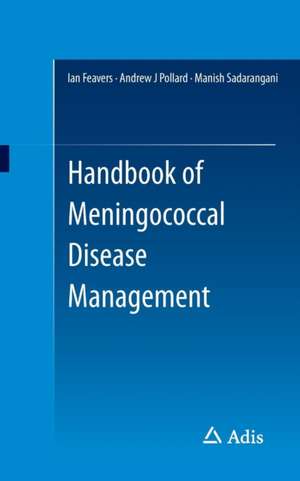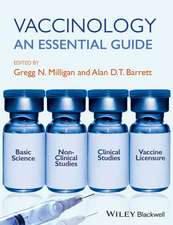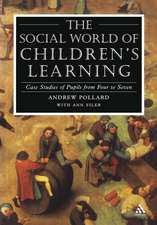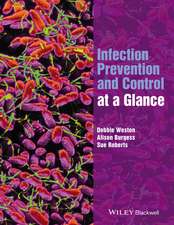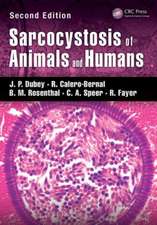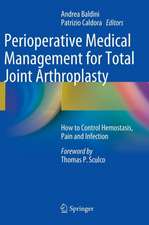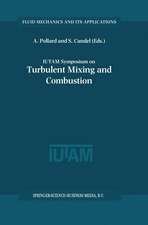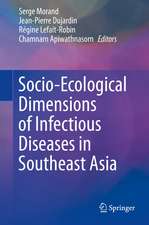Handbook of Meningococcal Disease Management
Editat de Ian Feavers, Andrew Pollard, Manish Sadaranganien Limba Engleză Paperback – 19 ian 2016
Preț: 326.06 lei
Preț vechi: 343.21 lei
-5% Nou
62.41€ • 67.82$ • 52.46£
Carte tipărită la comandă
Livrare economică 22 aprilie-06 mai
Specificații
ISBN-10: 3319086278
Pagini: 100
Ilustrații: XXI, 111 p. 17 illus., 2 illus. in color.
Dimensiuni: 127 x 203 x 7 mm
Greutate: 0.14 kg
Ediția:1st ed. 2016
Editura: Springer
Colecția Adis
Locul publicării:Cham, Switzerland
Public țintă
Professional/practitionerCuprins
1. Introduction and epidemiology of meningococcal disease
Neisseria meningitidis
Disease surveillance
Case fatality and sequelae
Epidemiology of meningococcal disease
Capsular groups causing disease
Current issues
Summary points
References
2. Carriage and transmission of Neisseria meningitidis
Introduction
Detecting the carrier state
The natural history of meningococcal carriage
Epidemiology of carriage
Other Neisseria species
Effect of vaccination on carriage
Summary points
References
3. Pathogenesis of invasive disease
Introduction
Transmission, adaptation, and penetration to the circulation
Neisseria meningitidis and intravascular survival
Meningococcemia: a disease of the endothelial cells
Pathophysiological characteristics of clinical presentations of meningococcal disease
The immune response
Summary points
References
4. Diagnosis of meningococcal disease
Introduction
Conventional diagnosis
Molecular diagnosis
Typing of Neisseria meningitidis
Summary and future outlook
References
5. Clinical aspects of meningococcal disease
Introduction
Clinical spectrum of disease
Symptoms of disease
Disease outcomes and prognosis
Raising awareness of disease
Genetic factors
Summary points
References
6. Treatment of meningococcal disease
Introduction
Shock
Raised intracranial pressure
Antibiotic therapy
Adjunctive therapies
Where to manage children with meningococcal disease?
Summary points
References
7. Prevention of meningococcal disease through vaccination
Introduction
Polysaccharide vaccines
Protein-polysaccharide conjugate vaccines
Production and quality control of polysaccharide and conjugate vaccines
Immunological correlates of protection
Capsular group B vaccines
Summary points
References
Appendix
Management of bacterial meningitis in children and young people
Management of meningococcal disease in children and young people
Early management of suspected bacterial meningitis and meningococcal septicaemia in immunocompetent adults
Recenzii
Notă biografică
Ian Feavers, PhD,is Head of Bacteriology at the National Institute for Biological Standards andControl (NIBSC), UK. He received his PhD from the University of Newcastle uponTyne. After graduating he undertook postdoctoral research in molecular geneticsat the University of Sheffield and the Friedrich Miescher Institut in Basel.During the late 1990s, when new conjugate vaccines were being introduced, heheaded the laboratory responsible for the control and standardization ofmeningococcal and pneumococcal vaccines. He continues to oversee an activeresearch program on the molecular genetics and immunology of meningococcalantigens. Because of his broad experience of bacterial vaccines and molecular biology,he has been closely involved with a number of meningococcal vaccinedevelopments. He regularly contributes to WHO and EU guidelines, has been anadvisor to the International Vaccine Institute’s typhoid conjugate vaccineinitiative, and serves on the Public Health England invasive bacterial diseasesforum. He is one of NIBSC’s observers on Joint Vaccination and ImmunisationCommittee (JCVI) and a member of the JCVI subgroups on meningococcal andpneumococcal vaccines. He is a former editor of the Journal of Applied Microbiology and is currently an associateeditor of Human Vaccines andImmunotherapeutics. He has over 100 publications, including peer reviewedresearch papers. He teaches on vaccine related courses at the University ofLondon, University of Surrey, and is a Visiting Professor at Imperial College.
Andrew J Pollard,FRCPCH PhD, is Professor of Paediatric Infection and Immunity at theUniversity of Oxford, Director of the Oxford Vaccine Group, Fellow of St CrossCollege, and Honorary Consultant Paediatrician at the Children’s Hospital,Oxford, UK. He obtained his medical degree at St Bartholomew’s Hospital MedicalSchool, University of London in 1989 and trained in Paediatrics at BirminghamChildren’s Hospital, UK, specializing in Paediatric Infectious Diseases at StMary’s Hospital, London, UK and at British Columbia Children’s Hospital,Vancouver, Canada. He obtained his PhD at St Mary’s Hospital, London, UK in1999 studying immunity to Neisseriameningitidis in children and proceeded to work on anti-bacterial innateimmune responses in children in Canada before returning to his current positionat the University of Oxford, UK in 2001. He chaired the UK’s NICE meningitisguidelines development group, the NICE topic expert group developing qualitystandards for management of meningitis and meningococcal septicemia. He chairsthe UK Department of Health’s Joint Committee on Vaccination and Immunisationand the European Medicines Agency scientific advisory group on vaccines. His researchincludes the design, development and clinical evaluation of vaccines; includingthose for meningococcal disease and enteric fever and leads studies using ahuman challenge model of (para)typhoid. He also runs surveillance for invasivebacterial diseases and studies the impact of pneumococcal vaccines in childrenin Nepal. He has supervised 23 PhD students and his publications include over300 manuscripts and books on various topics in pediatrics and infectiousdiseases.
Manish Sadarangani,MRCPCH, DPhil, is a Clinical Lecturer and Honorary Consultant in PaediatricInfectious Diseases and Immunology at The Children’s Hospital, Oxford, UK. Hecompleted his DPhil with the Oxford Vaccine Group in 2011, studying Opaproteins as a potential novel vaccine candidate for protection against capsulargroup B meningococcal disease, and completed a Fellowship in PaediatricInfectious Diseases in Vancouver, Canada in 2013. Current research interestsinclude meningococcal disease, in particular the development of newmeningococcal vaccines, childhood meningitis and encephalitis, the influence ofthe human microbiome on allergic and infectious disease, and antimicrobialstewardship.
Caracteristici
Written and edited by key thought leaders and developed using the latest clinical evidence and guidelines
High quality full-color supportive illustrations, tables and graphs enable complicated concepts to be made clear to readers with different levels of background understanding
Descriere
This concise pocketbook will provide readers with an overview and background of meningococcal disease, treatment options and emerging therapies, and methods of prevention. The book was originally commissioned due to recent developments in vaccinations to prevent meningococcal disease. This book reviews the disease progression and associated risk factors; its pathogenesis and diagnosis; methods of treatment and prevention, both current and emerging; and the future directions of meningococcal disease management. The book is ideal for busy healthcare professionals, as it covers all aspects of the disease and its treatment in a condensed and manageable format, whilst including the most up-to-date treatment guidelines and algorithms.
